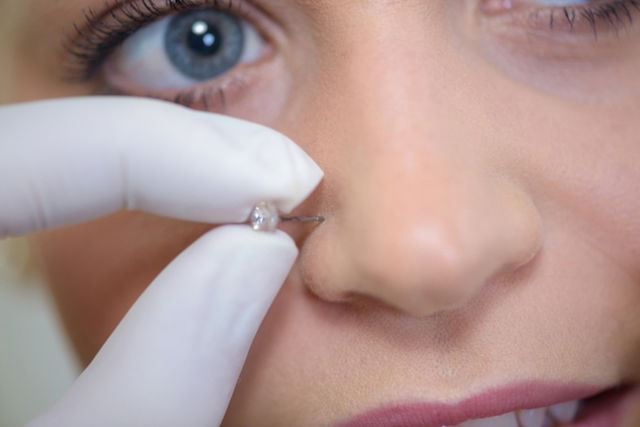Infected piercings usually present with intense pain, swelling and redness during the healing phase. These symptoms are notably more significant than a fresh piercing, which will usually cause some discomfort and discharge in its early stages.
Treatment for infected piercings should be guided by a health care professional based on the type of wound and degree of inflammation noted. General recommendations are to keep the area clean and dry, avoid moisture and sweat and to take medications as prescribed by the doctor (which may include anti-inflammatories or antibiotics).

Infected piercing symptoms
It is normal to have mild local swelling, clear discharge and some pain following a piercing, whether it is in the bellybutton, ear or mouth. However, piercings that become infected will worsen, and usually present with the following symptoms:
- Redness or swelling that does not improve in 3 days
- Redness or swelling that spreads to the skin around the piercing
- Intense or intolerable pain
- The presence of pus that can be white, yellow or green. It can also be mixed with blood.
- Fever or general malaise
If you experience any of these symptoms, you should see your doctor immediately to start treatment, which will likely involve prescription anti-inflammatories and antibiotics.
Piercing aftercare
If you suspect your new piercing has become infected, you should consult your doctor for assessment. Until you are seen, you should consider the following recommendations:
- Wash your hands well before touching the piercing.
- Wash the area, about twice a day, with water and mild soap and pat dry with a towel or clean gauze. The soap should be of a neutral pH or antibacterial.
- Keep the area dry and avoid any moisture from sweat or discharge. Make sure you use loose, breathable clothing to ensure the skin remains dry.
- Eliminate any possible friction that can be caused by clothing or use of accessories.
- Cleanse the area with saline and cotton. You can make your own saline solution with 250 mL (or 1 cup) of warm, clean water and 1 teaspoon of salt.
- Apply antiseptic, like iodine, to prevent infections in the area.
- Take an anti-inflammatory like ibuprofen to reduce pain and swelling.
- Be mindful of your diet as some foods like soda, sweets and fried food, can delay healing. Consider including food with anti-inflammatory properties in your diet, like saffron and garlic.
If inflammation does not improve with these measures, make sure you see your family doctor. Treatment with oral antibiotics, like cephelaxin, or with topical antibiotics may be required.
If your mouth piercing (e.g. on the tongue or lip) become infected, you should opt for soft foods to decrease discomfort, pain and effort of eating.
You should avoid using products like honey, aloe vera or other home made ointments, as these can attract debris and dust to the area and interfere with healing. Products with alcohol, iodine or hydrogen peroxide can irritate the skin and should only be used for treatment of larger wounds, as directed by a health care professional.
How to prevent swelling
To avoid swelling of the piercing site, it is important to take some precautions after placing it, such as:
- Do not let clothing or accessories rub against the area where the piercing was placed.
- Prevent the accumulation of sweat or secretion in the region.
- Always keep the area clean and dry. Avoid swimming in pools, lakes or the ocean until the wound has healed completely.
- When cleaning the area, avoid touching the jewelry, and when necessary, do so with clean hands, to avoid the accumulation of secretions that could lead to infection.
Furthermore, the piercing should always be done in a reliable location, as the use of contaminated tool can cause serious infections. Improper hygiene practices in piercing locations can also increase the risk of transmitting diseases such as hepatitis and HIV.
Ointments for treatment
Ointments for inflamed piercings, like moisturizers, corticosteroids or antibiotics, can help reduce inflammation and/or infection at the site.
Thus, some ointments that your dermatologist can describe are are neomycin + bacitracin ointment or dexamethasone ointment.
These ointments should be used as prescribed after a careful assessment, so that the best type is indicated for a speedy recovery.
